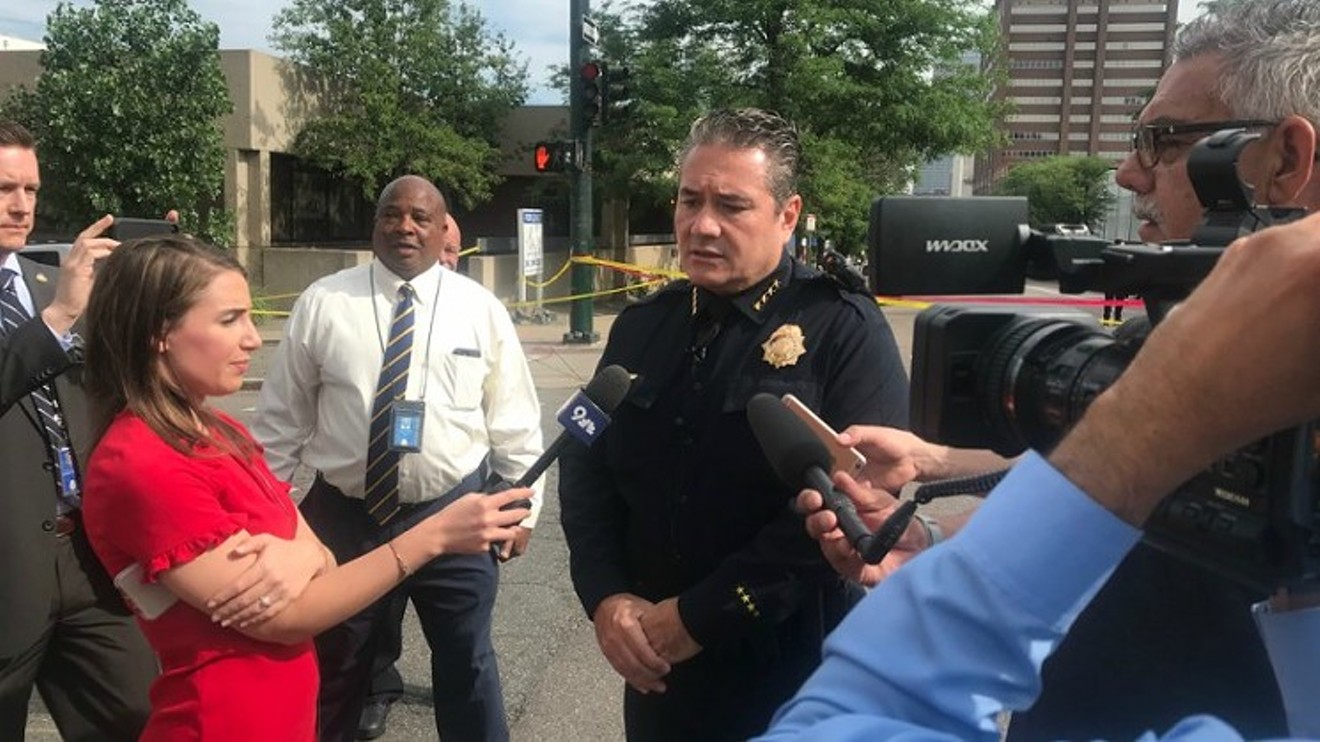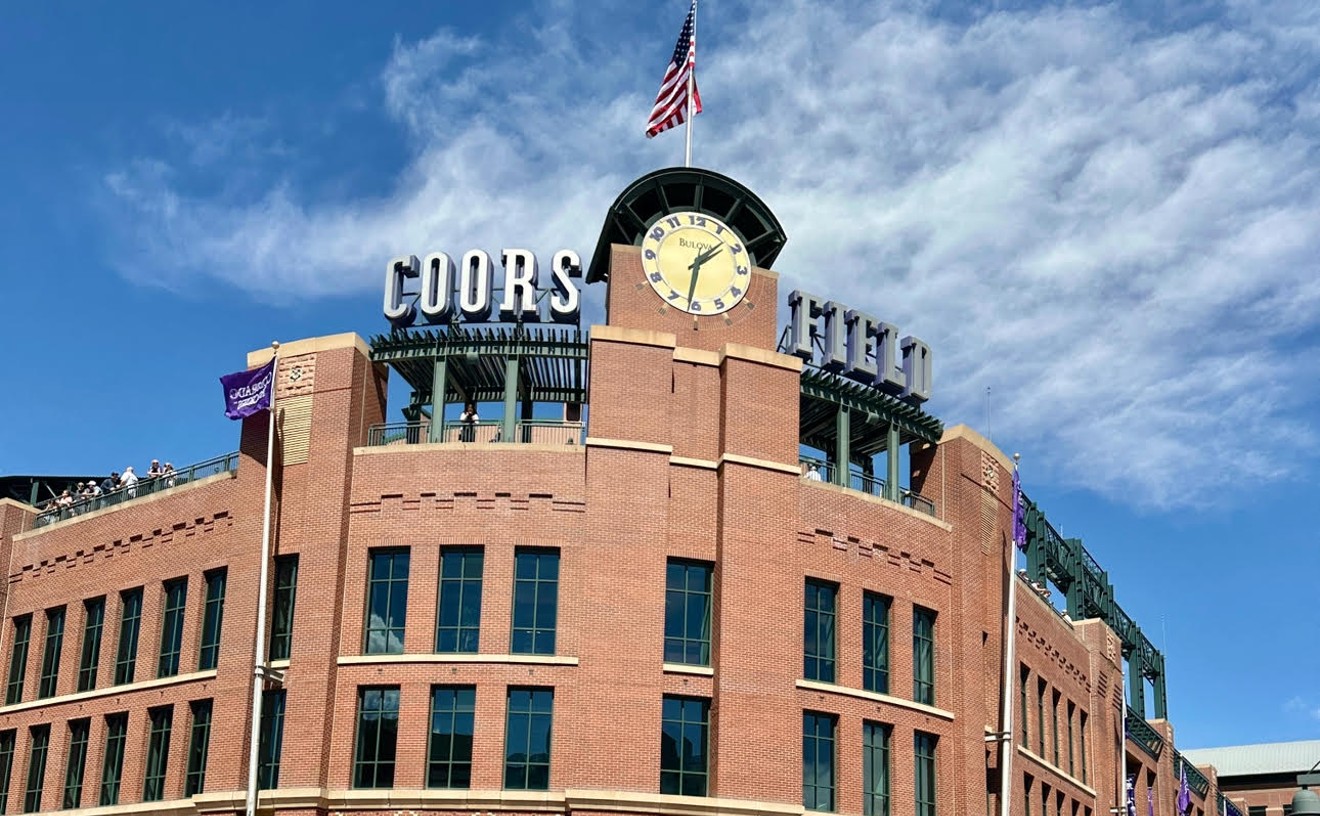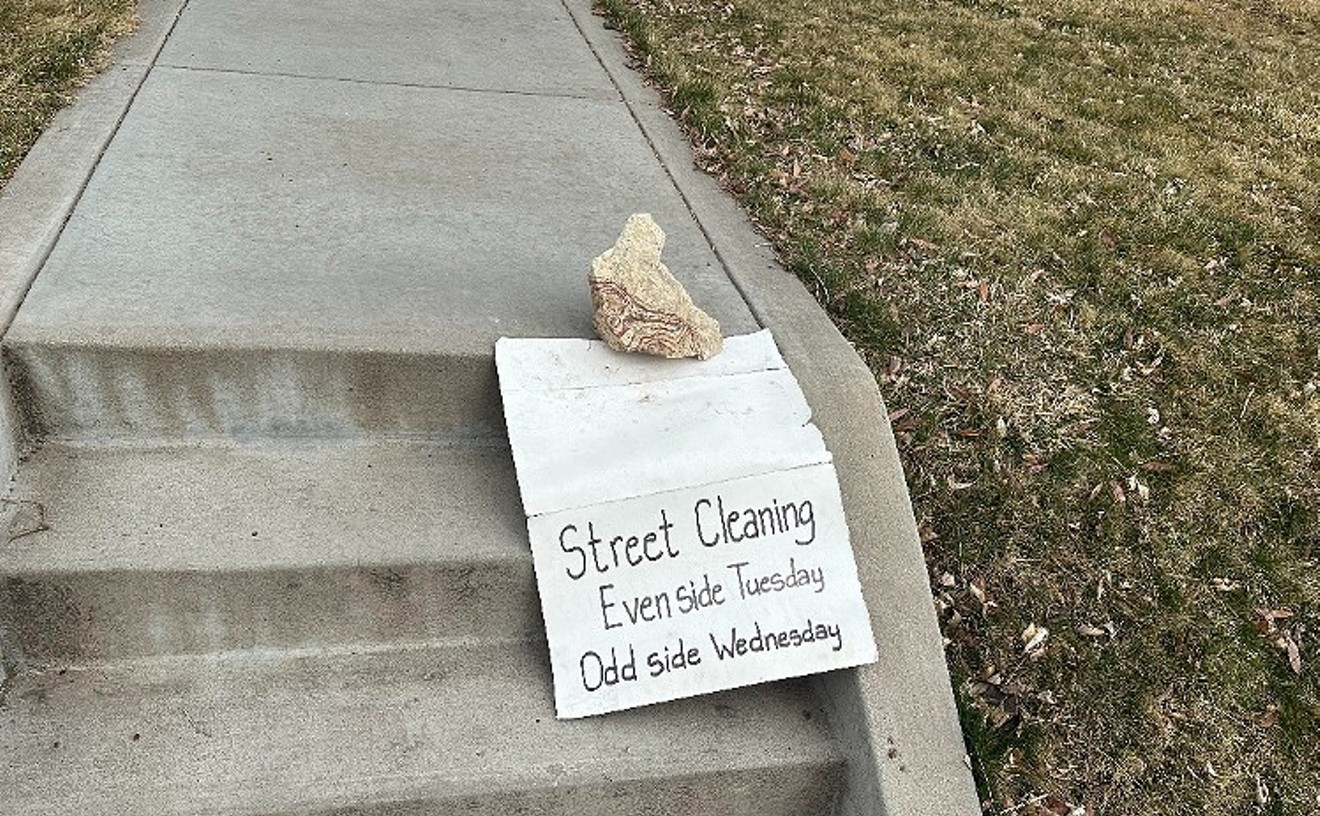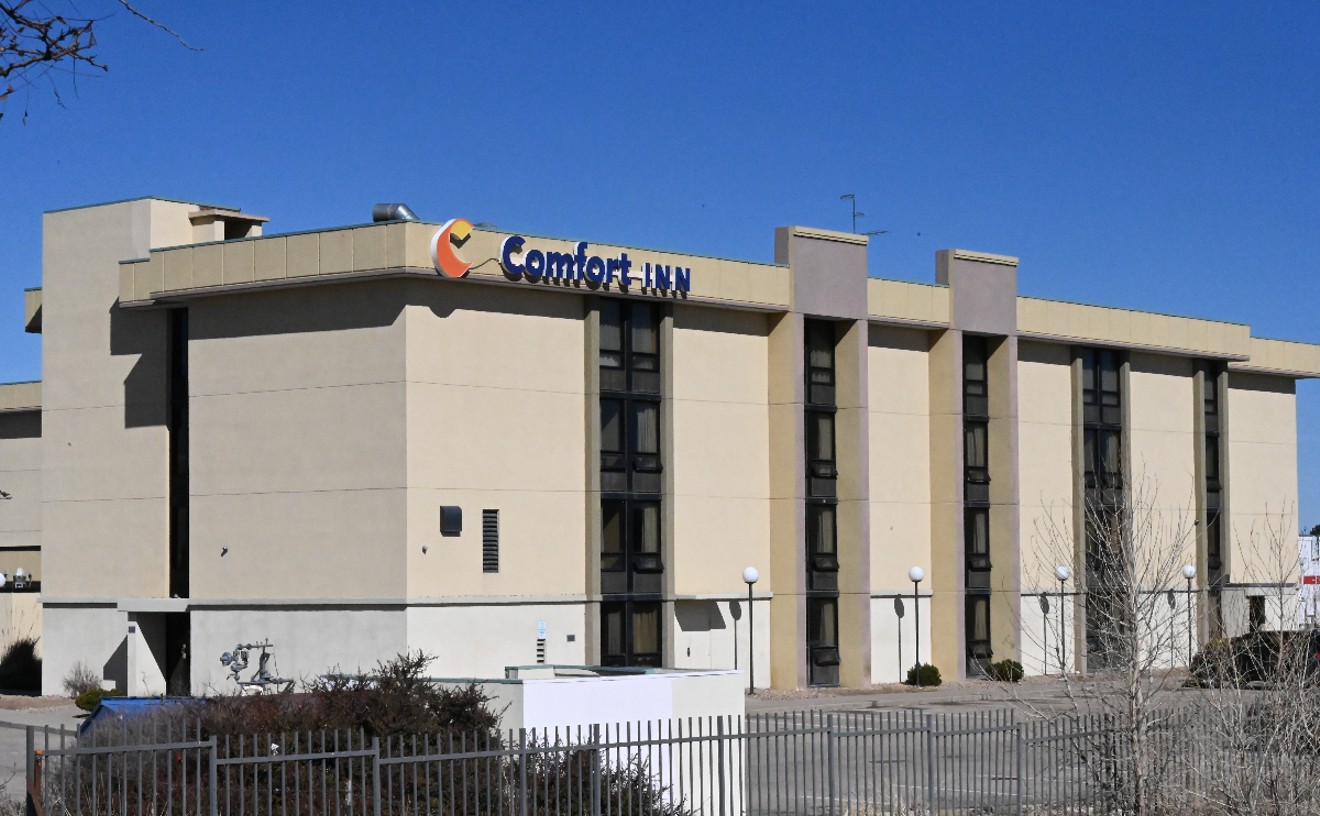Pazen was able to usher in a new use-of-force policy more than eighteen months in the making, and earlier in August, he announced that such incidents during arrests declined 21 percent during the first half of 2019. Meanwhile, negative headlines related to reform-minded advocates and Denver's police union, which were commonplace during the White era, have all but vanished, at least for now.
At the same time, however, violent crime appears to be on the rise in Denver. If this trend continues, or if a divisive police shooting like the one involving Colorado Springs's De'Von Bailey happens in the Mile High, the lingering goodwill toward Pazen could evaporate quickly. But he hopes his emphasis on crime-prevention strategies and the positive relationships he's building with the officers under his command can reduce offenses of all sorts over the long haul.
Our conversation with Pazen took place before we published our analysis of new Denver crime data, though we were able to share some of the findings with him, including a 10 percent increase in homicides from 2017 to 2018. As you'll see, Pazen's responses studiously avoid any criticism of White and concentrate on reform measures rooted in community involvement. But he expresses frustration about a dispute with some members of the media over the DPD decision to encrypt police radio traffic and rejects any suggestion that the tactical shift in any way contradicts his frequent statements about the importance of transparency.
His look back begins well before he was sworn in as chief.
Westword: Where are you from originally, and when did you first get interested in a law enforcement career?
Chief Paul Pazen: I was born and raised in Denver. I'm as Denver as it gets. I was born at Denver Health Medical Center, I went to Denver public schools. I've only lived in Denver other than the years I was in the Marine Corps. My interest in law enforcement is completely tied to giving back to the community that gave to me. I grew up to a single parent in Denver, in a community in northwest Denver that helped me, and I felt an obligation to give back.
After getting out of the Marine Corps, I joined the Denver Police Department. I started in January of 1995, and I've been very fortunate to have a lot of great assignments. I was a training officer, a neighborhood police officer, I had the opportunity to work on the SWAT team and I was also assigned to Internal Affairs, which was equally important. I was promoted throughout the ranks and always had the deep desire to help the community. I focused my efforts on doing that in every assignment.
Does your background in these various jobs help you in your current role?
If you want to lead an organization, it's good if you've held different positions. No one understands what it takes in each of those spots better than the people who've served in them. That's allowed me to maximize the effectiveness of the opportunities. But I definitely had support from the community I grew up in, northwest Denver, as well as some of those internal mentors still with the department, and those that have retired and who gave me advice. I'm not here if it wasn't for the people whose shoulders I stand on. That includes community members, community leaders and current and former officers of the police department.
Your predecessor as chief, Robert White, was criticized in some quarters for allegedly not making it a priority to get enough community input on important issues such as changes in the use-of-force policy. Was that something on your radar when you became chief?
It's all interwoven with serving the community. We have to serve the community by addressing crime issues and trying to prevent crime from occurring in the first place. But we also have to serve the community by having effective relationships. Getting out there and making sure we have that trust from the community, balancing all of that, and making sure we get as many perspectives out there as possible in some of those difficult areas we are involved in. That's how we find balanced solutions.
Chief White was also criticized by the Denver Police Protective Association, with Nick Rogers, the head of the union, arguing that he was out of touch with the department's rank and file. Was it a priority for you to address that dynamic?
All I'll say is that we looked to find common ground with our community, but also with our labor groups and our employee groups — to make sure that we can really come together on issues that need to be addressed. That's been our approach in many of these different programs, many different initiatives we've been able to launch. We've taken a truly collaborative approach. Instead of focusing on areas of difference, we focus on areas where our goals are aligned and try to make sure we're maximizing those different common interests for the greater good, whether that's service to the community or balancing the needs of the women and men who make up the police department.
Would you say that morale within the department was a problem when you took over as chief?
Again, I can't speak to anything prior to us starting this role. What I can tell you is that it is important to us — important that, as part of our strategic plan, we're taking care of the people who take care of the people. We want to make sure the women and men of the department, both sworn and civilian, have the tools and support necessary to do this very difficult job. I can only speak on what we've done, and we've had a great opportunity to lead this very strong department.
Part of it is demonstrating that we care about our team's work-life balance, and demonstrating that we believe in resiliency, that we believe in wellness, and demonstrating that everyone is heard. We have a big feedback loop to make sure any and all concerns are addressed, and addressed immediately. I think a big part of it is going out, face to face, and interacting with every member of the department, whether that be at roll call or holding specific meetings to ensure that every member of our team knows and understands our strategic plan, and knows and understands where we are, where we're going, how we're going to get there and what we believe in.
[Here's a presentation about the strategic plan offered by Pazen this past May.]
How would you sum up where you are, where you're going, how you're going to get there and what you believe in?
Again, it's all tied to our strategic plan. Where we are is that for any crime, we want to treat people with respect and dignity. Where we are going is reducing social harms. Oftentimes, there are underlying or causational factors of the work we do: mental health, substance abuse, fear of crime, multi-modal transportation. How we're going to get there is by utilizing the precision-policing model.
You may have heard Director [Troy] Riggs [of Denver's Department of Safety] talking about using data and drilling down to help people and reduce those social harms. If there are segments of our community where people need more assistance, instead of throwing up our arms and saying, 'That's not something we do,' we want to collaborate with nonprofits and faith-based groups and other city agencies in order to figure out how we can provide those services to reduce social harm.
Another part of precision policing is coming at domestic violence with a whole different approach, and we've had tremendous success so far with an outreach model. It's the same with gang reduction and prevention. It's not just about going out and putting handcuffs on folks. It's how can we help people succeed by outreach and connecting people with resources. That's a strategy we're implementing so we can have long-term success. And as I said, we believe in taking care of the people who take care of the people. None of this is possible if we don't ensure that the work force has the tools and equipment they need to do these extremely challenging jobs.
Among those challenges is a rise in violent crime in Denver. Murders have been going up this year, and earlier this month, there were four shootings in a twelve-hour period, leading to three deaths.
What I can say is that none of those incidents are related. But we really look at each and every homicide not only from the perspective of bringing justice to the families in solving them, but we also try to look at them to find ways to prevent future violence.
Again, each one of these is different, and it's unfortunate that they happened in such a short amount of time. But overall, we're making significant progress with regard to domestic violence and gang activity, and those are not things that were done on accident. We were very intentional in these outreach models, in resourcing the units and making sure they were supported and had the staff necessary to do this type of work, and we continue to do that. The team of officers, supervisors and command staff, we see ourselves as a learning organization. Hopefully, we can figure different things out to reduce these social harms and keep people safe.
We recently did an analysis of data about Denver from the Colorado Bureau of Investigation, and it showed that violent crime overall in the city went up by 8 percent from 2017 to 2018, and murders rose by 10 percent during that same period. Much of this took place before you became chief, and it appears that you don't want to address anything that happened prior to you taking over. But how much does that concern you?
You're right: We're not going to be critical of anything that happened before our time, and I don't want to comment on your exact numbers, because I haven't seen them. But we did see an increase in homicides in 2018, and we're keenly aware of it. Our approach is that by looking at each one of these and identifying causal factors, we can look at what we can do to prevent them from occurring in the future and how we can keep the community safe. And I am confident that we will be able to make progress with regard to the crime numbers.
Collaboration is at the heart of everything we're trying to do. Many of the successes we have pointed to, those were only possible through collaboration: listening to different people's perspectives, different segments of the city, people who live in different geographical areas that were able to help us come up with some meaningful solutions. So far, the outcomes have been very positive.
The use-of-force policy is one area of collaboration, and since it went into effect, incidents [during arrests] are down 21 percent. We're thankful for the members of the community who came together, for the input they brought, and we're proud of this very strong and progressive use-of-force policy. The community members, the law enforcement officers, and everyone who was part of this community effort deserve credit for what we've been able to accomplish so far.
Are there any current or upcoming initiatives for which you're using this collaborative approach?
I would point to looking at curfew as an example of this. [At present, Denver's curfew ordinance prohibits youth from being in a public place or on public property from 11 p.m. to 5 a.m. Sunday through Thursday and 12 a.m. to 5 a.m. Friday and Saturday. Click to learn about exceptions to this rule.] We have young people from across the entire city who are helping us in an ongoing collaborative group. We have folks from Parks and Rec, from Denver Public Schools. We have members of strong community organizations that work with young people, including the Park Hill Collective Impact, and people like Francisco Gallardo [executive director of Gang Rescue and Support Project, or GRASP], who are really taking a look at curfew, and they have had some great ideas on how to accomplish what the whole program is about, which is keeping young people safe. We've asked youth within our community, as well as advocates, to come up with different suggestions for us, so we can really home in on doing that type of work without any kind of traditional negative aspects for curfew violations.
That's an ongoing and continuing process, and I'm very proud of the work that they've brought to the table. It's something very important to us: Myself and two division chiefs sit in on these monthly or bi-monthly meetings. We're not just handing it off. This is something we really believe in, and we're working hard to keep young people safe without creating any kind of undue burdens.

Chief Pazen at the scene of a standoff, fire and suicide near 6th and Inca in January.
Denver Police Department via Periscope
Our responsibility, first and foremost, is to keep the community safe, and prior to radio encryption, if a witness were to call in, say, a violent crime, that information would have been publicly broadcast, and anybody who had more than a dozen free apps on their cell phones could hear who called the police, who the witness on it was, and typically their name, their address and their phone number. That was the same with victims of crime, including victims of high-level crime. When reports are requested, whether through CORA [Colorado Open Records Act] or FOIA [Freedom of Information Act], all of that information is redacted in order to protect victims and witnesses. But with unencrypted radio traffic, you're broadcasting names, addresses, phone numbers and oftentimes dates of birth. That private information is critical to the safety of our community.
Here's a different perspective on it. In the past few weeks, there's been an upswell of frustration with Facebook and Apple and Google for sharing private conversations with contractors. And we're talking about public-safety information, where somebody is calling the police and reporting a crime. A lot of the time, these are health-related issues, such as when we're checking on a situation with somebody in crisis who may be considering taking his own life. And that was being publicly broadcast for anybody to hear on a free cell-phone app. That's highly sensitive information, and we have to make sure we're protecting victims and witnesses, including juveniles, because juvenile information is broadcast, too, and by state law, you're not supposed to publicly share their information. That's the same for sex-assault victims, too. But unencrypted radios were doing it.
That's why we worked with the media for over eight months to ensure there wasn't a loss of transparency. The media groups agreed on the material aspects of the contract, and there was a specific call-out in the agreement that the police department wanted absolutely no editorial control on any type of story. So the only sticking points were over indemnification and the auditor's clause. Indemnification was if any media member mishandled private information and it caused harm to that person, the person had a right to sue. We needed the indemnification clause because it protects our community. It would make the media member accountable — and that's what insurance is for.
The auditor's clause is something that every contract or agreement with the City of Denver is subject to. The auditor is the elected watchdog there to assure the people of Denver that any of these agreements is adhered to. And all of this has been misrepresented a couple of times. The police department is not going to look at the media members' records or notes or anything along those lines, and the auditor has the right to make sure the contract is in the best interest of the community members. And that's it. We even added things about laws protecting the media to the auditor's clause to make sure that the auditor would ensure that all of the laws and governance that protects media members were in place. That was specifically called out in the agreement as well.
We did all of this in good faith months before our equipment was due to be replaced, and we asked the media to come up with solutions. The first meeting, they brought up delayed transmissions, but all that means is that you're broadcasting private information ten minutes later. The whole purpose is to make sure our community members and our officers are safe, and delaying that private information for victims and witnesses isn't solving the issue. Then we looked at computerized dispatch access, but that was a privacy issue, too, because you couldn't electronically redact private information. So after four meetings, the only viable option left was allowing the media to purchase a radio that would let them hear the traffic. But the media members are not fond of the indemnification clause and the auditor's clause, both of which are required to maintain the best interest of the community at large.
There have been complaints about the cost of the radios [about $4,000 apiece].
Again, these are not things that benefit the police department. They benefit the community itself.
Some reporters have also complained about a perceived decrease in the number of press releases in favor of notifications by tweet that include very few details because of Twitter's character limits. They see that as a transparency issue, too.
That's a mischaracterization as well. We want to get information out, and doing it on Twitter is similar to a radio transmission, where we let people know that a particular type of incident occurred at a specific location. Media members can then go out there and do the kind of work they do. We're not shortening or limiting information that's put out by tweet by any means, and our team carries a phone with them 24 hours a day, so media can get additional details that are available at that time.
We want to make sure we're getting information out in a timely way, and sharing what we can share at that moment. And if it's something we can't get out right away, we will work hard to get it out as soon as we can in the future. By no means is that any type of effort to limit the amount of information. We want to make sure that the press gets information in a timely manner, because it's important that the community gets the information in a timely manner.
What are some of your main priorities as you move deeper into your second year as chief?
We want to ensure that people can get safely from point A to point B. We are moving folks over to ensure traffic safety and pedestrian safety — that people are moving forward safely. We have some key announcements coming up in the near future with regard to that. We also have a couple of initiatives that are collaborations with the community to get additional help to address preventable types of crime. And we want to make sure we're continuing to use data to guide the decisions of where our resources are deployed in the city, to maximize our ability to prevent crime from occurring in the first place, and that if it does occur, we're responding appropriately. Not only do we want to investigate appropriately, but we want to follow up to make the community feel good about it as well.
We also want to continue to be accessible. We haven't dodged a single interview, and we really want to have a good, positive relationship with the press and the media. We are committed to working with the media and being transparent about sharing information. We think we've demonstrated that, and we'll continue doing that moving forward.












